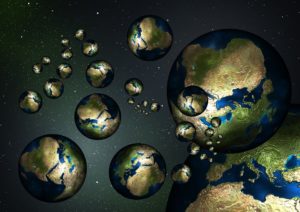Many people, both theists and atheists alike, see Darwinian evolution as a God substitute. If evolution is true, then God is not needed to explain why life emerged on this planet. God becomes superfluous. Many atheists go so far as to argue that Darwinian Evolution disproves the existence of God or at the very least removes any epistemological warrant for belief in God. This is why so many atheists use evolution as an argument for the truth of their worldview.
Evolution is seen by many Christians to be a sort of big bad wolf that will undermine Christianity if you let it in by its chinny chin chin. Since Evolution removes any need to appeal to a Creator to explain how all of the different kinds of life arose on this planet, many Christian Apologists feel called to go to war against this theory.
However, these conclusions seem to me to be unjustified. I don’t think evolution removes the need for God at all. I certainly don’t think it disproves His existence or even leaves us without good reasons to believe He exists. Let me explain why Christians should not be afraid of evolution.
God Is Still Needed To Explain The Origin and Fine Tuning Of The Universe
Even if one conceded that evolution removed the need for God to bring about life on the planet, it would still not be the case that God would have no part in His creation. We have powerful scientific evidence that the universe began to exist out of nothing a finite time ago, and that at the beginning, the laws of physics were precisely calibrated to enormous precision so that life could arise in the universe.
The Big Bang — In 1915, the scientist Albert Einstein developed his theory of General Relativity. His theory predicted that the universe was in a constant state of either expansion or contraction. Einstein was bothered by the implication of an expanding or contracting universe so he added a cosmological constant to the theory which would allow the universe to remain in a static state, neither expanding nor contracting. Einstein’s cosmological constant is now widely known to be ad-hoc, that is, there’s no reason it should have been added. It just put in there to keep the universe, on this model, from expanding. Einstein later recanted the cosmological constant of his theory, saying it was “the greatest blunder of my scientific career”. General Relativity predicted an expanding universe. Later on in 1929, the American Astronomer Edwin Hubble glanced through his telescope and noticed that the light coming from the distant galaxies were “redder” than they should have been, and by that, I mean that the light was shifted to the red end of the light spectrum as a result of the Doppler Effect. Hubble concluded that the reason the light from these distant galaxies were farther in the light spectrum than they should have been, was because these galaxies were moving away from us at fantastic speeds! Hubble had discovered empirical evidence for the theoretical prediction of Einstein’s theory of General Relativity.
The fact that the universe is expanding had startling implications. Simple backward extrapolation lead to the conclusion that if the universe is expanding, it must have had a beginning. Why is that? Because if the universe is getting bigger, and bigger, and bigger, as it gets older, and older, and older, then when one rewinds the clock, one sees that the universe was smaller and smaller in the past. If the universe gets bigger as you go forward in time, then the universe gets smaller if you go backwards in time. If one rewinds the clock far enough back in time, the universe becomes as small as the period at the end of this sentence. Go back farther still, and the universe shrinks down to nothing! This is the origin of all matter and energy, and even space and time! This was dubbed by astrophysicist Fred Hoyle; “The Big Bang”.
Now, it seems to me that if the universe had a beginning to its existence, it must have had a cause. Nothing comes into being without a cause. We know this from 3 factors; number 1, nothingness has no properties. It is literally non-being. It is the absence of being. It isn’t anything. If nothingness has 0 properties, then it follows that it has no causal powers, and if it has no causal powers, it follows that it cannot bring the universe into existence. In fact, calling nothingness an “it” isn’t a correct way of speaking, since saying “it” presupposes that there’s “something” there to be called an “it”. The second reason is that we have an endless number of examples of things coming into being, and we know that they had a cause for their beginning. Thirdly, we have no examples whatsoever of something coming into being without a cause. Therefore, we have good inductive grounds for affirming that if something comes into being, it had a cause.
Since the universe began to exist, and since whatever begins to exist has a cause, it follows that the universe had a cause. This cause must be spaceless since space didn’t exist prior to the big bang. It must be timeless since time began at the big bang. It must be immaterial since material objects cannot exist in the absence of space. It must be enormously powerful, since it was able to create the universe out of nothing. And it must be a personal being, since out of two immaterial objects — abstract objects and unembodied minds — only the latter has causal ability.
So, the evidence supports the conclusion that a spaceless, timeless, immaterial, powerful, personal Creator is responsible for creating the universe. This sounds a lot like God to me.
If you want to look at this subject in more depth, check out my blog post “The Kalam Cosmological Argument” and pick up my recently published book Inference To The One True God: Why I Believe In Jesus Instead Of Other Gods.
The Fine Tuning Of The Universe — Over the past 50 years scientists have been stunned to discover that the laws and constants of physics surprisingly come together in a shocking manner to enable the universe to permit the existence of life. If these constants and quantities were altered in any way, the balance would be destroyed, and life could not possibly exist anywhere in the universe.
For example, if The Strong Nuclear Force were slightly stronger, it would be so aggressive at binding protons and neutrons together in the nucleus of the atom, that no atoms in the universe would exist that consisted of only a single proton. This is bad because the hydrogen atom is an atom that consists of only one proton in its center. So, if the Strong Nuclear Force were too strong, no hydrogen atoms could exist in the universe. Only heavy elements would. On the other hand, if this force were too weak, it would be too insufficient to bind together protons and neutrons at all. Therefore, only hydrogen would exist. Life chemistry is impossible if hydrogen either doesn’t exist, or is the only element there is. The odds of the Strong Nuclear Force taking the just right value is 1 in 10^30 (that’s a 1 followed by 30 zeroes).
If Gravity were too strong, stars would burn up too quickly and too erratically before life could develop. On the other hand, if gravity were too weak, stars would never get hot enough for nuclear fusion to transpire, thus many of the heavy elements needed for life (which are essentially “cooked” inside the cores of stars) would never form. The odds of gravity being just right is 1 in 10^36 power. In the documentary, The Case For A Creator based on the book of the same name, Lee Strobel said this was the same odds of having a ruler that stretched from one end of the universe to the other that was divided by one inch increments. The odds that anyone could put their finger on 1 specific inch out of the 14 billion light years worth of inches are the same odds that gravity should take the just right value.
If the ratio of electrons to protons were off by a little bit, electromagnetism would so overpower gravity, that galaxy, star, and planet formation would be disrupted. Hence, no galaxies, stars, or planets could exist in the universe. This is obviously bad because if there are no stars or planets, there’s no home for life to live on. The odds that the just right number of electrons to protons should exist is 1 in 10^37. According to astrophysicist Hugh Ross, this is the same odds that a person could pick one marked dime out of a pile that fills one billion continents the size of North America!
There are only 3 possible explanations for why the universe is so fine tuned. It’s either fine tuned out of physical necessity, it’s finely tuned by chance, or it’s finely tuned because an Intelligent Designer caused these laws of physics to take the values they did. Physical Necessity is implausible. There’s just no reason to think that these constants and quantities couldn’t have been any different than they are. Chance is even more implausible. But since neither necessity nor chance are good explanations, that leaves Intelligent Design as the only remaining alternative. Not only is it the only remaining alternative, but it has enormous explanatory power. If God created the universe, He would certainly have the ability to make these constants and quantities fall within the life permitting range.
If you want to look at this subject in more depth, check out my blog post “The Fine Tuning Argument For God’s Existence (Updated Version)” and pick up my recently published book Inference To The One True God: Why I Believe In Jesus Instead Of Other Gods.
The Local Fine Tuning — In addition to the laws of physics, which affect the entire universe. There are also certain parameters that need to be just right in a certain local region, lest life be impossible in that region. Any region that’s going to have life needs a moon of the just right size, a planet not too far nor too close to its home star, with a rotation rate no longer or shorter than 24 hours, an atmosphere of the just right level of thickness, and is neither too big nor too small, and this planet must be surrounded by 4 gas giants that are neither too big or small, nor are too far away nor too close to the life hosting planet. There are several other parameters a region of the universe must have in order to contain life.
If you want to dive into this subject in more detail, I recommend reading my book Inference To The One True God: Why I Believe In Jesus Instead Of Other Gods. I have an entire chapter on this subject in that book.
As you can see, God would still have a lot to do in creating. He would first need to bring the universe into existence, then finely tune the laws of physics, then providentially arrange a region with the 400+ features required for a planet to support life.
A Natural Explanation Is Not A Replacement For God
People hold that evolution, if true, would rule out God and leave Him with no role to play in developing life. However, there are many other areas of the universe where we have a natural explanation for how these things operate and yet no one thinks that they rule out God.
In chapter 1 of her book Origins: Christian Perspectives On Creation, Evolution, and Intelligent Design, astrophysicist Deborah Haarsma gives an example of the way weather operates. She points out that The Bible clearly teaches that God governs the weather and yet we also know of solid and proven natural explanations for how the weather operates. Dr. Haarsma points to several Bible passages proclaiming that God causes rain and drought (see Deuteronomy 11:14-17; 1 Kings 8:35-36; Job 5:10; Job 37:6; Jeremiah 14:22), and she notes that the writers of Deuteronomy, the Psalms, and Jeremiah refer specifically to storehouses of rain and snow (Deuteronomy 28:12, 24; Psalms 135:7; Jeremiah 10:13). Haarsma goes on to point out the natural explanations behind these. She writes “…water evaporates from the ground level, rises to where the air is cooler, and condenses into water droplets that form clouds. We learned how cold fronts and warm fronts and low pressure systems bring rain. When we watch meteorologists on television, we hear that scientists now use sophisticated computer models to help them understand and predict the weather a few days in advance. Their ability to understand meteorology is especially important for farmers, airline pilots, military personnel, and coastal residents. Every year scientists develop increasingly accurate computer models of the weather.“
Dr. Haarsma then invites us to imagine heated debates between whether The Bible is correct or whether the natural explanations of weather are correct, and to imagine lawsuits being filed against schools for teaching the natural explanations, and so on. Dr. Haarsma then writes ““The majority of Christians say that when it comes to the weather, both science and the Bible are correct. God governs the weather, usually through the scientifically understandable processes of evaporation and condensation. And the majority of atheists today would also agree that having a scientific explanation for the weather, by itself, neither proves nor disproves the existence of God.” Her conclusion is that we would never conclude that natural explanations behind the weather would contradict scripture and leave God with no role to play in the process, so why do it with evolution?
I agree with her. The Bible is correct that God controls the weather, but he uses nature to do it. In the same way, God created all of life. Could He not have used evolution to do so?
We have other examples of God working through the natural laws He created. In the book of Exodus, we read about Moses leading the Israelites to freedom from bondage in Egypt. In chapter 14, when we come upon that famous scene of the crossing the Red Sea, we read that God caused the parting of the waters through the use of a strong wind. Exodus 14:21 says “Then Moses stretched out his hand over the sea, and all that night the LORD drove the sea back with a strong east wind and turned it into dry land. The waters were divided,” (emphasis mine). God worked through a natural process (i.e the wind) to bring about the parting of the Red Sea.
Evolution Might Possibly Be Ammo For A Design Argument
This last point occurred to me after having a Google Hangout conversation with Zachary Lawson and Richard Bushey recently. Lawson referred to a paper written by Kirk MacGregor in which he argues that evolution is impossible unless a God endowed with middle knowledge exists. And as I was listening to his brief explanation of MacGregor’s argument, it occurred to me that a lot of arguments against evolution do hinge on the statistical impossibility for it to occur. But what if the improbability doesn’t prove that evolution is false, but establishes a different conclusion. One might be able to mount a design argument that employs Darwinian Evolution in its premises. If Evolution is possible only under a very narrow set of circumstances (i.e natural conditions), and the odds of those natural conditions coming about are extremely low, then perhaps one could argue that God purposefully set up the natural conditions so that nature would be able to get the job done.
Kirk MacGregor seems to refer to this argument in In A Molinist-Anabaptist Systematic Theology, MacGregor writes; “But what kind of God could create a universe in which astronomically improbable mutations would repeatedly occur in the course of nature, as opposed to the special creationist’s universe where these mutations did not occur but where God repeatedly intervened to produce the same long-term effects as if they had occurred? I contend that only a God endowed with middle knowledge would be able to create such a universe.”
According to what Zachary Lawson told me in that conversation, MacGregor is simultaneously making an argument for God’s existence and the truth of Molinism using Darwinian Evolution as a key premise.
One could perhaps word the argument as the following syllogism
1: If A God Endowed With Middle Knowledge does not exist, evolution could not have occurred.
2: Evolution has occurred.
3: Therefore, a God Endowed with Middle Knowledge exists.
On this argument, premise 1 would say that God would have to use His middle knowledge (His knowledge of everything that would occur if certain factors are in place) in order to guide evolution. This would not have God causally determining the processes anymore than His use of middle knowledge to orchestrate human history involves causing people to choose what they choose. It’s just that God is acting on His knowledge of what would occur if X were in place. So God could be involved in orchestrating evolutionary history and yet be as hands-off as He is when human beings are making free will choices. This would respect the naturalistic nature of the theory but would still require God to make it work. Premise 1 would also say that evolution is enormously unreasonable to believe on an atheistic worldview and non-Molinist theistic views. This would be due to probability argument against it’s occurring in the absence of a guiding intelligence. Just as an automated factory putting computers together would be improbable unless someone first created the factory.
The idea of using evolution as a simultaneous argument for God’s existence and Molinism intrigues me. Like a scientist who only has a faint notion of a theory before it’s proven, I would like to investigate and research this further to see if it can developed into a robust apologetic. The thought actually occurred to me before my conversation with Bushey and Lawson, but I wasn’t sure if anyone else caught on to it. I’d love to read MacGregor’s paper on this.
How gloriously ironic would it be to take the atheist’s favorite weapon away from him and then use it on him.
Conclusion
Christians no more need to be afraid of the possible truth of Darwinian Evolution than they do the possible truth of string theory. God is still required for the origin of the universe, the fine tuning of the universe, and the local fine tuning. Secondly, natural explanations don’t exclude God’s role in a natural process. Otherwise, we would have to conclude that when Exodus 14:21 says God parted the Red Sea with a strong wind, that therefore God Himself did not really part the Red Sea. And as Deborah Haarsma implied, we would have to conclude that God doesn’t govern the weather contrary to what The Bible says.
Moreover, evolution could possibly be used as a design argument, if one can show that it’s too improbable for evolution to occur unless God exists and guided the process through His middle knowledge.





